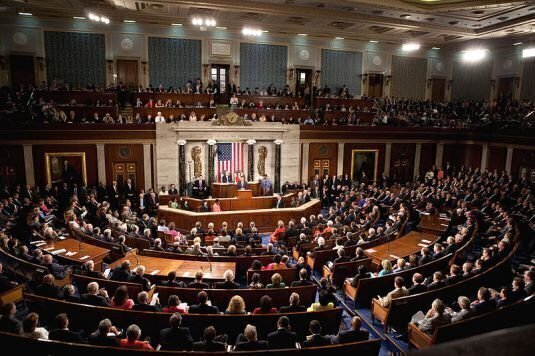As pressure mounts on the Senate to pass a health-reform bill, Mitch McConnell has eliminated part of its annual August vacation. So what are the constitutional and legislative roots of this long-held tradition?
On Tuesday, McConnell announced that the Senate will delay the start of its recess by two weeks. In that statement, the Senate Majority Leader didn't indicate when the chamber would return from its break, but with a glut of legislation to consider, the Senate would likely reconvene after Labor Day.
 The Constitution provides for the Senate and the House to call a recess, but if that recess lasts for more than three days, one chamber must get permission from the other chamber for an extended recess.
The Constitution provides for the Senate and the House to call a recess, but if that recess lasts for more than three days, one chamber must get permission from the other chamber for an extended recess.
Article 1, Section 5, Clause 4 says that, “Neither House, during the Session of Congress, shall, without the Consent of the other, adjourn for more than three days, nor to any other Place than that in which the two Houses shall be sitting.” In modern Washington, political parties use tactics such as short “pro forma sessions” to technically avoid official recesses, and to keep Presidents from making recess appointments of officials who need congressional approval after the Senate and House return from a recess.
The August recess, however, also has a legislative component. The Legislative Reorganization Act of 1970 was noteworthy because it allowed Congress to establish an electronic vote-counting system to speed up its deliberations. But in an amended Section 132 of the act, Congress agreed that “unless otherwise provided by the Congress, the two Houses shall adjourn sine die not later than July 31 of each year,” or in an odd-numbered year, “by concurrent resolution adopted in each House by roll call vote, for the adjournment of the two Houses from that Friday in August which occurs at least thirty days before the first Monday in September (Labor Day) of such year to the second day after Labor Day.”
A sine die adjournment is a recess motion that doesn’t specify a day for Congress to meet again. Also, Section 132 says Congress can’t take the August recess if a war declaration is in effect.
The 1970 Act recognized a summer recess tradition that dated back to 1791, when Congress met in Philadelphia (and not Washington, at least for another decade). For generations, congressional members weren’t full-time politicians, and they needed to return home to tend to their work. Also, the lack of modern comforts made full-time congressional sessions in August in Washington, D.C., very uncomfortable. Early attempts to ventilate and cool the Senate chambers failed and air conditioning didn’t arrive there until 1929.
The heated chambers of Congress in the summer were also known to test the tempers of already riled House and Senate members. John Nance Garner, one of Franklin Roosevelt’s Vice Presidents, noted that, “No good legislation ever comes out of Washington after June.”
After World War II, a crowded legislative calendar saw more work being pushed into late summer. Senator Margaret Chase Smith advocated for a two-month recess during August and September, arguing that it would circumvent “confused thinking, harmful emotions, destructive tempers, unsound and unwise legislation, and ill health.”
During the 1960s, Senate Gale McGee pushed for an official August recess on the congressional calendar. The Senate’s official website recounts the fight between younger members who wanted scheduled vacation time with their families and a chance to see constituents, and older members who wanted to conclude the Senate’s business by August and spend limited fall time in Washington.
In the end, McGee’s contingent prevailed with the 1970 Act. The official August scheduled recess also allowed for campaigning during presidential years and other benefits.
If the current Senate decides to forgo its August recess, the action isn’t without precedent in the post-1970 era. In 1994, the Senate met into August as it debated Clinton-era health care reforms, and in 2005, Congress came back to pass legislation about Hurricane Katrina relief.
There also has been pressure from some groups for the current House to remain in session during August to tackle other battles about the debt ceiling and tax reform, as the Senate wrestles with health care.
Scott Bomboy is the editor in chief of the National Constitution Center.







